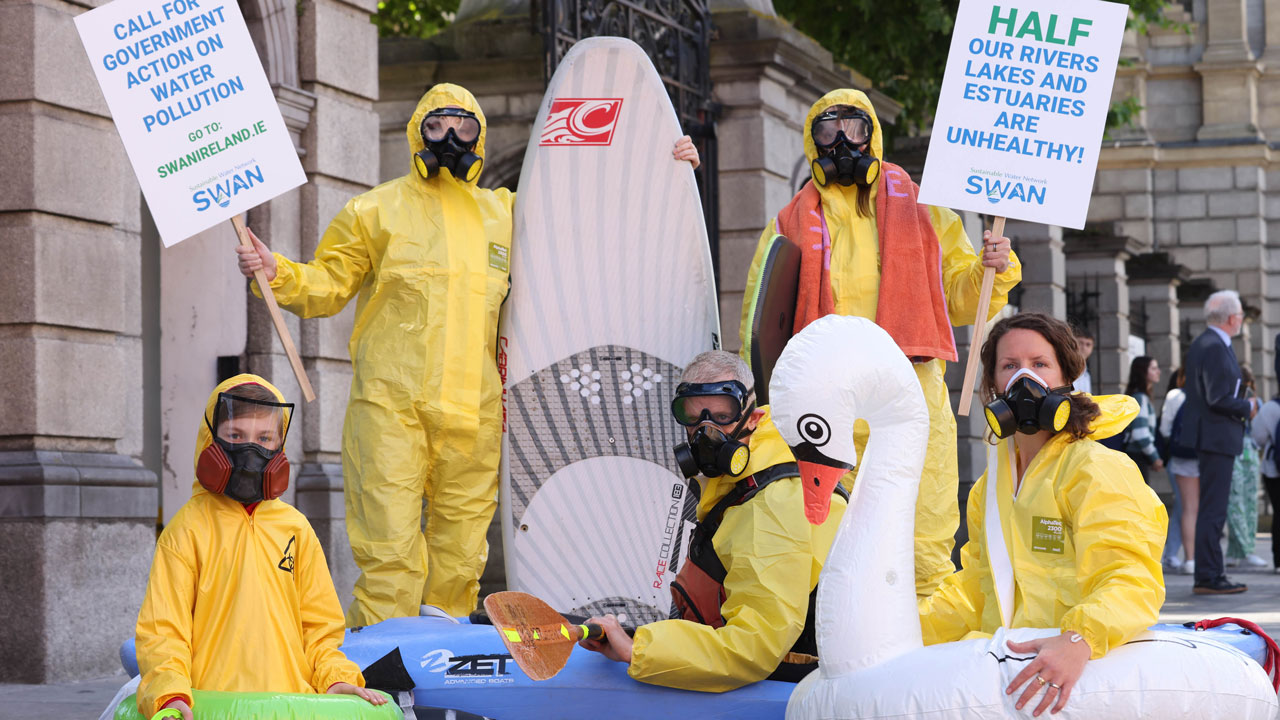The Sustainable Water Network (SWAN) today launched a campaign outside Leinster House calling for the government to strengthen its draft plan for managing Ireland’s inland and coastal waters. The network of 25 environmental NGOS are deeply alarmed at the prospect of another weak water plan being published that will condemn our rivers, lakes and coasts to another five years of continued deterioration and pollution.
The plan is the third River Basin Management Plan (RBMP) since the first was put in place twelve years ago in accordance with the EU Water Framework Directive1 and is currently being finalised by the government. SWAN sees the draft plan as completely lacking the strong ambition, and targeted actions needed to tackle the pressures degrading our waters and to restore them to good health.
Sinéad O’Brien, SWAN Coordinator, said: “Half Ireland’s rivers, lakes and estuaries are unhealthy and water pollution is escalating, driven by inadequately treated sewage, unregulated land drainage and river alterations, and by unsustainable land use, especially intensive agriculture in vulnerable and nutrient-saturated catchments. The future for our rivers, lakes and coast is bleak if we continue down this path.”
“Every five years we get a golden opportunity with the River Basin Management Plan to introduce robust controls to stop the reckless destruction of our water environment, which is so vital to the wellbeing of all of us. We are disappointed to be faced with the draft of yet another plan that will fail to fix the problem and we urge the Government to see sense and bring in a Plan that constitutes a real step change in water protection rather than one that tinkers at the edges and shies away from tackling the most serious threats for fear of stepping on any toes.”
“Ultimately, under law we must restore ALL our waters by 2027, but this plan lacks the specific, targeted and time bound measures that would provide a clear path to achieving this. We have seven key recommendations2 for fixing the plan and approximately two-thirds of the submissions made during the public consultation support these. We need a plan for our water environment that everyone can get behind and the Plan as it stands definitely isn’t it.”
“A clear example of where the plan fails is with sewage, which is responsible for the pollution of more than 200 water bodies, yet the proposed Plan doesn’t include measures to fix these by the 2027 deadline. The fact that raw and poorly treated sewage is still being released into our rivers, lakes and seas is completely unacceptable and even more unacceptable is the fact that this plan won’t fix that. We’re calling for the Irish Water Investment Plan to include action to halt sewage pollution in these waters, as a priority.”
Dr. Elaine McGoff, Natural Environment Officer with An Taisce said: “We know that agriculture is by far the biggest pressure on our waters, yet there is no risk assessment done, on intensive farms, or derogation farms. We need these assessments in order to get a clear view of the potential water pollution resulting from this type of land use, and to identify the appropriate measures that should be put in place to stop or prevent it. How can any plan for our waters say it is going to prevent deterioration of water quality if it isn’t even assessing the risk posed by this type of agriculture?”
Pádraic Fogarty, Irish Wildlife Trust, said: “Our key recommendations are to reform the Arterial Drainage Act, introduce a prohibition on wetland drainage and to develop a national wetland restoration plan. This would not only restore our rivers and lakes, while improving water quality, it would also deliver immense benefits for climate, nature and flood resilience. It really is a no-brainer but there is no mention of this in the plan.”
Bernie Connolly, Cork Environmental Forum, said: “Over the summer period, many of us will bathe, surf or kayak in our wonderful coastal waters. However, this plan has no targeted measures to tackle the non-land based pressures on our coastal waters such as hydraulic dredging, offshore renewable energy infrastructure, shipping and seaweed harvesting. How can the plan hope to succeed when it essentially ignores this whole area of our waters? Our recommendation is to include coastal and transitional waters in the plan with these targeted measures detailed.”
Mark Boyden, Streamscapes Project Director said: “For the plan to work, we need the public and local river groups/trusts involved from the start in the development of action plans for their local waters. And they need to be facilitated and resourced to do this. We also need full transparency and access to up to date water quality information.”
Sinéad O’Brien, SWAN Coordinator said: “Swimmers, surfers, kayakers, parents, in fact every single one of us has a stake in the success of this plan. We all need and use our water environment so we all need it to be healthy. After so many years of government failure to protect and restore our waters we are heading towards a future none of us want to contemplate. We need a stronger, more ambitious plan that will deliver for our much loved local rivers, lakes and coast. And we can achieve this, but we need to act now before the current plan is finalised. We need to let those with the power to make it happen know that we won’t put up with another five years of failure. Go to our website swanireland.ie to find out what you can do.”
Take our action here: https://swanireland.ie/take-action/restore-our-waters/

